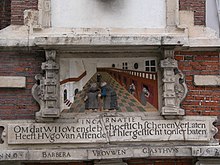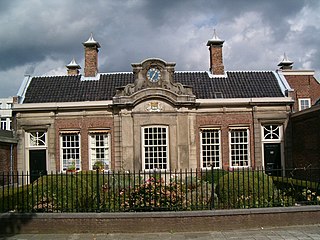
The Hofje van Noblet is a hofje in Haarlem, Netherlands.

The Frans Loenenhofje is a hofje in Haarlem, Netherlands, on the Witte Heren straat.

The Hofje van Staats is a hofje in Haarlem, Netherlands, on the Jansweg 39, close to the Haarlem railway station.

The Hofje van Loo is a hofje on the Barrevoetstraat 7 in Haarlem, Netherlands.
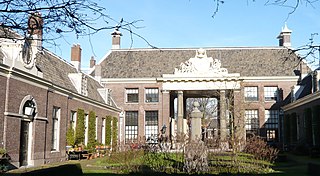
The Teylershofje is a hofje in Haarlem, Netherlands with 24 houses.

Haarlem is one of the cities in the Netherlands that has a number of hofjes. Some of them are still in use with boards of regents. Many of these are members of the Stichting Haarlemse Hofjes. The word 'hofje' just means small garden, because the hofjes are generally small houses grouped around a community kitchen garden with a water pump. Often they were attached to a larger field for bleaching linen or growing orchards, but today those fields have been long used for city expansion and only the central gardens can still be seen.
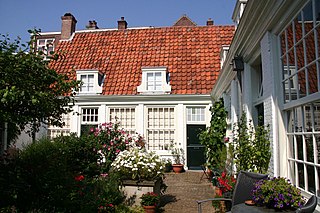
Hofje van Guurtje de Waal is a hofje in Haarlem, Netherlands.

The Remonstrantshofje is a hofje in Haarlem, Netherlands. It is one of the hofjes in Haarlem that is traditionally used to provide housing for elderly people.
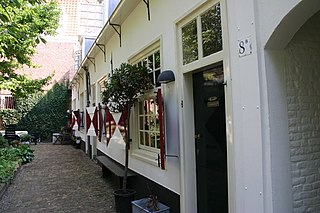
The Brouwershofje is a hofje on the Tuchthuisstraat in Haarlem, Netherlands.

The Hofje van Willem Heythuijsen is a hofje in Haarlem, Netherlands. It was founded in 1650 by the testament of Willem van Heythuysen on the site of his summer residence outside the city walls of Haarlem on land that was considered Heemstede property until it was annexed in 1927. It is one of the few hofjes of Haarlem to be built outside the city walls. It has a 'T' shape and has a small open courtyard and a garden still intact.

The Vrouwe- en Antonie Gasthuis is a hofje on the Klein Heiligland 64a in Haarlem, Netherlands. It is open on weekdays from 10-17.00.

The Proveniershuis is a hofje and former schutterij on the Grote Houtstraat in Haarlem, Netherlands.

Museum van de Geest was created in 2020 when Het Dolhuys, the national museum for psychiatry in Haarlem, the Netherlands, merged with the Outsider Art Museum from Amsterdam. Het Dolhuys had been founded in 2005 in the newly renovated former old-age home known as Schoterburcht, located just across the Schotersingel from the Staten Bolwerk park.
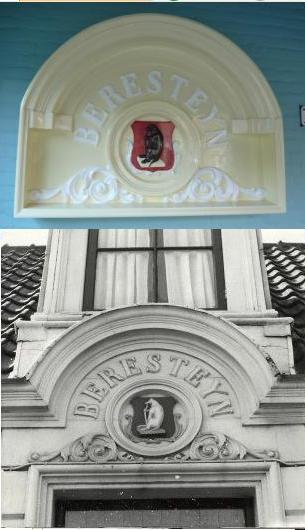
The Hofje van Codde en Beresteyn is a hofje in Haarlem, Netherlands. The current building is from 1968 and is located on the J. Cuyperstraat, which is named for the architect who designed the Cathedral of Saint Bavo next door, Joseph Cuypers. This hofje is the wealthiest hofje foundation in Haarlem with the most modern facilities for its inhabitants. Poor (devote) Catholic women of Haarlem 60 years and older are still welcome to live there for free.

The Janskerk or St. John's Church is a former church in the Dutch city of Haarlem. Today it houses the North Holland Archives.

The Hofje van Oorschot is a hofje on the Kruisstraat 44 in Haarlem, Netherlands.
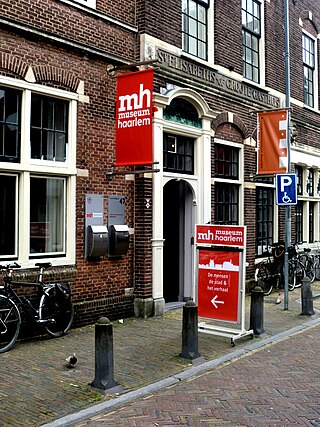
Museum Haarlem is a city museum on Groot Heiligland 47, Haarlem, Netherlands, located across the street from the Frans Hals Museum. It shares its front door with the ABC Architectuurcentrum Haarlem, which is located next door. The museum is devoted to presenting and preserving the cultural history of Haarlem and the surrounding region.

The St. Elisabeth Gasthuis (EG) is a former hospital complex of buildings founded in 1581 in Haarlem on the Gasthuisvest. The last location of the hospital on the Boerhaavelaan retains its hospital function and is part of the Spaarne Gasthuis (SG) today, formerly known as Kennemer Gasthuis (KG). The hospital complex on the Gasthuisvest was built for the "Minnebroers" monastery and was reclaimed after the Protestant reformation in 1581 and given by the city council to the hospital. As a hospital during four centuries, the complex underwent many major renovations. The main facade dates from 1871.

The Coomanshof is a former hofje in Haarlem, Netherlands, on the Witte Heren straat.

Elisabeth Gasthuis Poort is the address of a doorway in Haarlem. The neo-classical stone doorway is dated 1767 in roman numerals, and the gable stone set into it from 1612 was repainted in 2017. The entire doorway is part of the Elisabeth Gasthuis complex and has itself been declared one of the national monuments of The Netherlands.

